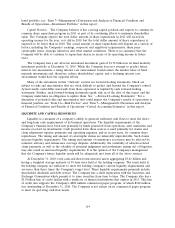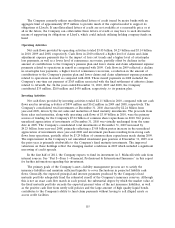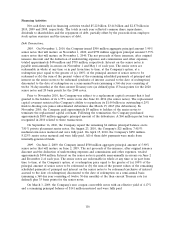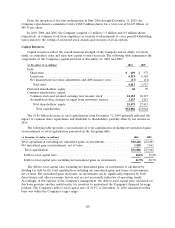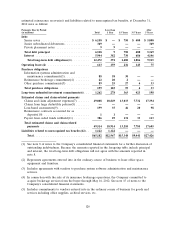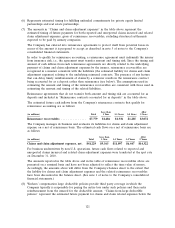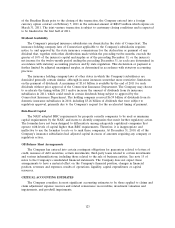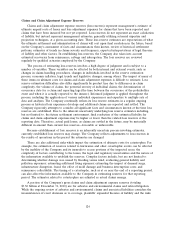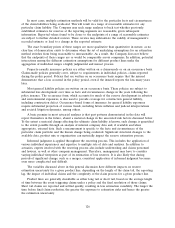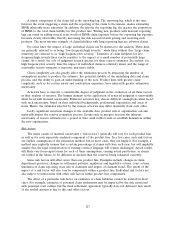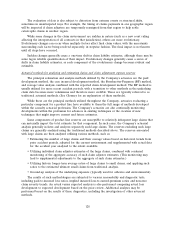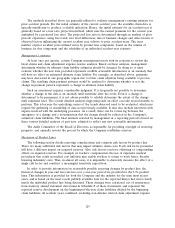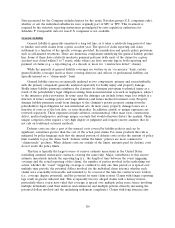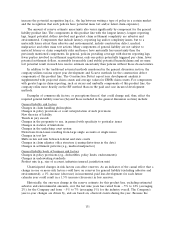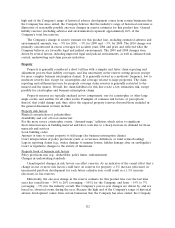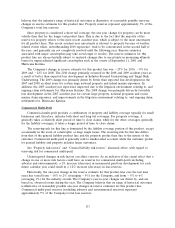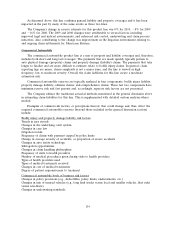Travelers 2010 Annual Report Download - page 136
Download and view the complete annual report
Please find page 136 of the 2010 Travelers annual report below. You can navigate through the pages in the report by either clicking on the pages listed below, or by using the keyword search tool below to find specific information within the annual report.Claims and Claim Adjustment Expense Reserves
Claims and claim adjustment expense reserves (loss reserves) represent management’s estimate of
ultimate unpaid costs of losses and loss adjustment expenses for claims that have been reported and
claims that have been incurred but not yet reported. Loss reserves do not represent an exact calculation
of liability, but instead represent management estimates, generally utilizing actuarial expertise and
projection techniques, at a given accounting date. These loss reserve estimates are expectations of what
the ultimate settlement and administration of claims will cost upon final resolution in the future, based
on the Company’s assessment of facts and circumstances then known, review of historical settlement
patterns, estimates of trends in claims severity and frequency, expected interpretations of legal theories
of liability and other factors. In establishing loss reserves, the Company also takes into account
estimated recoveries from reinsurance, salvage and subrogation. The loss reserves are reviewed
regularly by qualified actuaries employed by the Company.
The process of estimating loss reserves involves a high degree of judgment and is subject to a
number of variables. These variables can be affected by both internal and external events, such as
changes in claims handling procedures, changes in individuals involved in the reserve estimation
process, economic inflation, legal trends and legislative changes, among others. The impact of many of
these items on ultimate costs for claims and claim adjustment expenses is difficult to estimate. Loss
reserve estimation difficulties also differ significantly by product line due to differences in claim
complexity, the volume of claims, the potential severity of individual claims, the determination of
occurrence date for a claim and reporting lags (the time between the occurrence of the policyholder
event and when it is actually reported to the insurer). Informed judgment is applied throughout the
process, including the application of various individual experiences and expertise to multiple sets of
data and analyses. The Company continually refines its loss reserve estimates in a regular ongoing
process as historical loss experience develops and additional claims are reported and settled. The
Company rigorously attempts to consider all significant facts and circumstances known at the time loss
reserves are established. Due to the inherent uncertainty underlying loss reserve estimates including,
but not limited to, the future settlement environment, final resolution of the estimated liability for
claims and claim adjustment expenses may be higher or lower than the related loss reserves at the
reporting date. Therefore, actual paid losses, as claims are settled in the future, may be materially
different in amount than current loss reserves—favorable or unfavorable.
Because establishment of loss reserves is an inherently uncertain process involving estimates,
currently established loss reserves may change. The Company reflects adjustments to loss reserves in
the results of operations in the period the estimates are changed.
There are also additional risks which impact the estimation of ultimate costs for catastrophes. For
example, the estimation of reserves related to hurricanes and other catastrophic events can be affected
by the inability of the Company and its insureds to access portions of the impacted areas, the
complexity of factors contributing to the losses, the legal and regulatory uncertainties and the nature of
the information available to establish the reserves. Complex factors include, but are not limited to:
determining whether damage was caused by flooding versus wind; evaluating general liability and
pollution exposures; estimating additional living expenses; estimating the impact of demand surge,
infrastructure disruption, fraud, the effect of mold damage and business interruption costs; and
reinsurance collectibility. The timing of a catastrophe, such as at or near the end of a reporting period,
can also affect the information available to the Company in estimating reserves for that reporting
period. The estimates related to catastrophes are adjusted as actual claims emerge.
A portion of the Company’s gross claims and claim adjustment expense reserves (totaling
$3.30 billion at December 31, 2010) are for asbestos and environmental claims and related litigation.
While the ongoing review of asbestos and environmental claims and associated liabilities considers the
inconsistencies of court decisions as to coverage, plaintiffs’ expanded theories of liability and the risks
124


